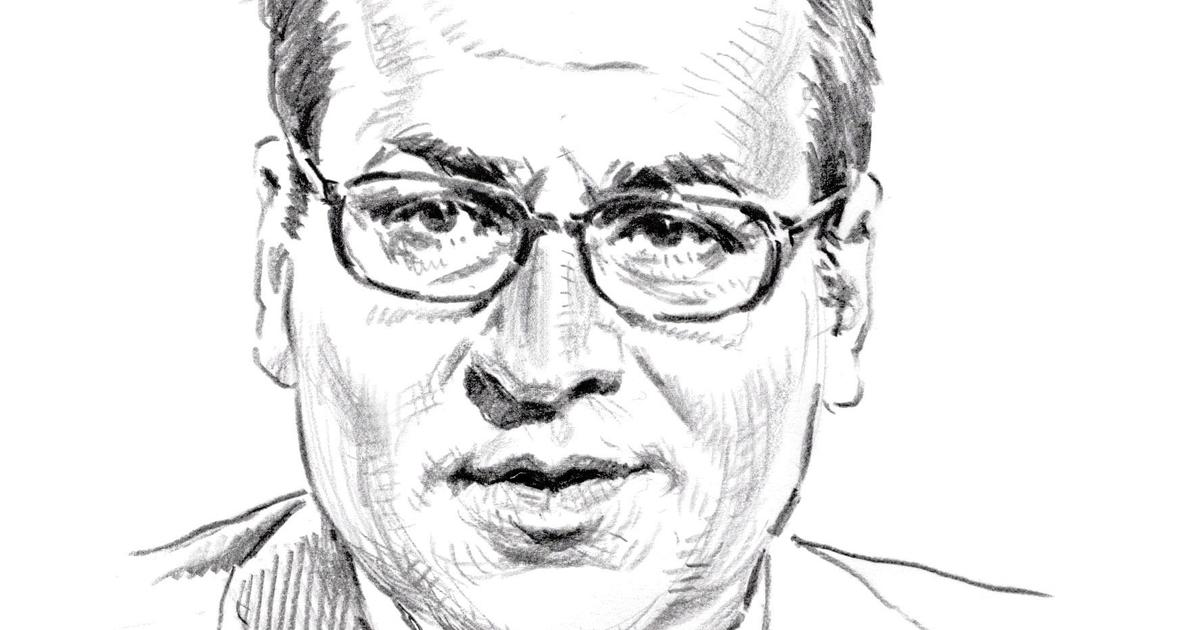GAZIANTEP, Turkey — In 1999, a powerful earthquake struck northwestern Turkey, killing more than 17,000 people, exposing government incompetence and fueling the economic crisis.
Amid the turmoil, a charismatic young politician took advantage of public anger to become prime minister in 2003.
That politician was Recep Tayyip Erdogan.
Now, as president, Erdogan faces challenges similar to those that ousted his predecessors, posing what may be the biggest threat to his political future in his two decades in power.
Several people look at the damage caused by the earthquake that devastated parts of Turkey and Syria, in Gaziantep.
(Sergey Ponomarev/The New York Times)
This past week,
the deadliest earthquake to hit Turkey
in nearly a century killed at least 35,000 people, and countless more bodies still lie buried beneath the rubble.
The earthquake struck after a year of persistently high inflation that has left Turkish families impoverished, leaving many with very few resources to recover.
Analysts noted that the aftermath of the earthquake has highlighted just how much Erdogan has reshaped the Turkish state.
His detractors accuse him of leading the country towards an autocracy
by limiting civil rights and undermining the independence of state institutions such as the Foreign Ministry and the Central Bank.
In addition, in a series of actions aimed at weakening its adversaries and centralizing control, it has restricted the powers of institutions such as the Army (which could have helped to have a better response to the earthquake), at the same time that it has filled other institutions with his supporters.
Erdogan acknowledged on Friday that his government's initial response to the disaster had been slow and that survivors' anger was growing, a sentiment that could hamper his bid to stay in power in elections scheduled for May 14.
Many people were also strongly questioning whether the poor quality of the construction was partly responsible for the deaths and destruction.
“I have been voting for this government for 20 years and I am telling all the people that I am very angry,” said Mikail Gul, 53, who lost five family members in a building collapse.
"I will never forgive them."
The president, who faced severe criticism in 2021 for the government's failure to control destructive fires, has long portrayed himself as a leader who is in touch with ordinary citizens.
In these last days,
he visited communities badly affected by the earthquake
.
Dressed in black and with a grim countenance, he visited the wounded, comforted those who had lost their homes and stressed the magnitude of the crisis.
“We are facing one of the biggest disasters in our history,” he said on Friday during a visit to Adiyaman province.
"It is a reality that we could not intervene as quickly as we wanted."
Residents stand by a collapsed building in Kahramanmaras, Turkey, near the epicenter of the earthquake.
(Emin Ozmen/The New York Times)
The 7.8-magnitude earthquake – the most destructive to hit Turkey in decades – and hundreds of aftershocks
rocked buildings along a 400-kilometre stretch of the south
, destroying thousands of them and causing thousands of damage of millions of dollars.
In Syria, on the other side of the border, so far there is a count of almost 4,000 deaths, a figure that is believed to rise considerably.
“This is the largest disaster Turkey has ever seen and it will inevitably generate a backlash against the government,” said Sinan Ülgen, director of Edam, an Istanbul-based think tank.
“But a lot will depend on how efficiently you can meet the needs of the affected population.”
The Turkish government has launched comprehensive relief efforts and has dispatched 141,000 aid and rescue workers to search for dead and injured people, distribute food, blankets and diapers and put up tents for the tens of thousands of people left homeless. , many of whom are sleeping in cars to ward off the subzero winter chill.
However,
many survivors have expressed frustration at the government's poor response
, saying the state was completely absent in the first moments after the event, leaving residents alone to seek refuge and pull their loved ones out of collapsed buildings. loved ones who had been trapped.
It is very likely that the lack of trained rescue teams and heavy machinery during the first crucial days has increased the death toll because many people who could have been saved in those moments were not rescued.
According to the residents, when the government agencies arrived, it seemed that their equipment was insufficient and that they could not coordinate the efforts of the volunteers who were already trying to help the survivors.
A camp set up for people displaced by the earthquake, in Osmaniye, Turkey.
(Sergey Ponomarev/The New York Times)
During his two decades as prime minister and president, Erdogan has argued for changes in the way Turkey is run to protect it from a range of internal and external threats, including military coups and terrorist groups.
Erdogan has also limited the role of the military
, which played a critical role in the government's response to the 1999 earthquake.
Turker Erturk, a retired admiral who served as commander at the relief center set up in that quake, said in an interview that the Army had intervened quickly.
But in the years since, the Erdogan government had limited those powers and the army had stopped planning and training for it, he said.
According to Erturk, after the earthquake on Monday, the government summoned the Army only after reproach from the population.
“This is because it is a one-man government,” he
commented.
"In authoritarian governments, those decisions are made from the top and orders are expected from him."
On Friday, the Army said on Twitter that its soldiers had been helping "since day one" and now had more than 25,000 troops deployed.
But their presence has not been noticeable in many of the hardest-hit areas.
Leading the government's response to the earthquake is the Disaster and Emergency Management Presidency, which critics say Erdogan has filled with supporters and given too much power to the detriment of other organizations such as the Turkish Red Crescent.
The quake has also led to increased scrutiny of the government's use of building codes to prevent buildings from collapsing, and some people in the area were angrily questioning whether shoddy construction could be blamed. and lousy contractors for at least some of the deaths.
A rescue worker places a Turkish flag on a building in Antakya, Turkey.
(Emily Garthwaite/The New York Times)
After the 1999 earthquake, Turkey tightened its building codes to make buildings more resistant to earthquakes.
But in the area devastated by the recent quake, there are areas where some buildings survived, while others nearby — some relatively new — collapsed entirely, raising questions about whether some contractors had cut corners.
In response to this claim, on Saturday, the Ministry of Justice ordered officials from the 10 earthquake-affected provinces to set up
investigation units for so-called earthquake crimes
and to appoint prosecutors to file legal charges against all "builders and those responsible” for the collapse of buildings that did not comply with existing codes.
For example, Yasar Coskun, the builder of a 12-story building that collapsed completely in the hard-hit province of Hatay, was detained at an Istanbul airport on Friday as he tried to board a flight to Montenegro.
Dozens of people are believed to have died when this building collapsed.
The earthquake caused billions of dollars in damage, and government plans will require another billion at a time when the state budget is already tight.
Before the quake, the Erdogan government shelled out billions of dollars for new spending to cushion the blow of high inflation to citizens ahead of the elections, an injection of money that some economists predict could take push the country into a recession this year.
In addition to the economic hardship, the quake will intensify the suffering of the Turks, and not in a way that makes them feel like they are helping an important cause, said Selim Koru, an analyst at the Turkish Economic Policy Research Foundation. .
“By its very nature, this comes out of nowhere and makes people even more despondent, and not just in the earthquake zone,” he said.
"The economy is going to suffer and I'm not sure this makes any sense of that suffering."
The proximity of the earthquake to the
presidential and parliamentary elections
that must be held before June 18 could give way to other challenges.
On Thursday, the Reuters news agency quoted an anonymous Turkish official as saying the destruction from the quake posed "serious difficulties" for the vote.
It was the first sign that the government might want to postpone them.
There is a coalition of six opposition parties trying to overthrow Erdogan
and trying to strengthen the economy and restore the independence of state institutions.
They have already begun to make the earthquake response an electoral issue.
But even some angry voters continue to trust Erdogan.
“We failed to pass this exam,” Ismail Ozaslan, a 58-year-old long-haul truck driver, told us in a Gaziantep park, where part of his family was crammed into a tent.
“We are like patients who are left to die.
There is no coordination."
But the reproaches to the local and national authorities, whom he accused of corruption and negligence, did not reach Erdogan.
“It's like a building that has a strong roof but where the pillars are rotten,” he
said.
“We have no alternative but Erdogan.
I hope that God gives him long life."
c.2023 The New York Times Company







